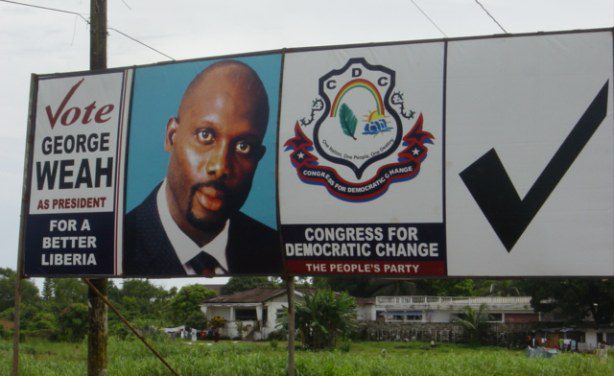Former Ballon d’Or winner George Oppong Weah, is among 20 candidates vying for Liberia’s presidency, as some 2.1 million people go to the polls on Tuesday Oct. 10 to elect a new leader of the West African nation after 12 years under Ellen Johnson Sirleaf, Africa’s first elected female president.
Weah, now 51, is not new to politics and the presidential race. After hanging up his boots in 2003, he founded the Congress for Democratic Change (CDC) party under which he ran for the 2005 presidential elections, emerging as winner of the first round but losing the runoff to Sirleaf.
It was a heartbreaking experience for the former AC Milan and Paris Saint Germain striker, who was counting on his pitch popularity to plough through a political terrain rendered vulnerable by 15 years of armed conflicts. While Weah maintains the 2005 presidential runoff was rigged in favour of his female opponent (after initially winning 28.3% of the vote in the first round, Weah lost the runoff 40.6% against 59.4% for Sirleaf), his critics believed the former Liberia captain, who singlehandedly sponsored the team during the country’s civil war, was not given the mandate because of his poor educational background.
Weah did not progress beyond high school by then while Sirleaf in contrast, was educated at Harvard in the United States and formerly worked at the World Bank and the United Nations and also served as Liberia’s minister of finance in the 1970s.
A new challenge for the former goal poacher?
Weah boasts of 193 goals from 411 club matches and 22 goals for the Lone Stars, but failed to score in the November 8, 2005 runoff against Sirleaf.
In a sportsmanship spirit, the former Monaco man, who had spells in Ivory Coast (Africa Sport) and Cameroon (Tonnerre Yaounde), accepted defeat and went back to the drawing board. What went wrong and what needed to be done, a university degree?

He backed out of the political scene and enrolled to study business administration at DeVry University in Miami, graduating and returning to Liberia in 2009 ahead of the 2011 presidential elections.
Contrary to wide expectations, Weah declined to be on top of the CDC ticket for the vote, standing as a running mate to Winston Tubman, a former justice minister and diplomat. Both men were defeated by Sirleaf, who clinched, in a landslide, a second six-year term following a boycott by CDC in the runoff to protest against an alleged rigging in the first round.
Three years later, Weah decided to play from the back and organise his defence and midfield properly, which he deemed as sine qua non for future success.
Playing from the back meant running for a lower political post such as the Senate. And on December 20, 2014, Weah defeated Robert Sirleaf, son of president Sirleaf, 78% to 11 % to represent Montserrado County, becoming the first Liberian athlete to be elected in the Legislature.
Three years more, time is ripe to attempt the ultimate again – the Presidency.
Weah will be running against a couple of other big guns notably outgoing vice president Joseph Boakai, prominent businessmen Alexander Cummings and Benoni Urey; former central bank governor Mills Jones and opposition figure Charles Brumskine.
Weah’s choice of running mate, Jewel Howard-Taylor, the ex-wife of former president Charles Taylor, has been slammed by many pundits. However, others believe it could be a sound weight for the former footballer whose campaign promises of better education and job creation have gained huge traction amongst the youths and middle age who keeping seeing him as the best candidate for change.
Initial results are expected before end of the week.








